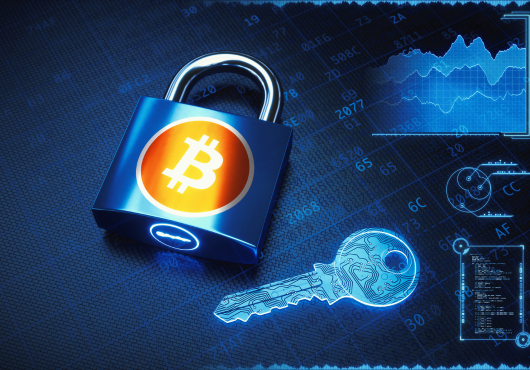Bitcoin+ Security™
BC-300
Defend Your Digital Wealth: Master Security Strategies- Cybersecurity Focus: Learn to secure Bitcoin networks and transactions
- Best Practices: Master the latest security protocols and risk mitigation
- Specialized Training: Ideal for those pursuing roles in cryptocurrency and blockchain security
Why This Certification Matters
At a Glance: Course + Exam Overview
- Instructor-Led: 5 days (live or virtual)
- Self-Paced: 30 hours of content

Who Should Enroll?
Cybersecurity Professionals: Acquire specialized skills to protect Bitcoin networks and transactions from emerging cyber threats and attacks.
Digital Asset Managers: Learn to secure Bitcoin holdings, manage wallet security, and implement strategies to protect investments from hacking and fraud.
Security Engineers: Gain expertise in deploying Bitcoin security protocols within corporate infrastructures, ensuring robust protection and data integrity.
Blockchain Developers: Understand the security implications of Bitcoin technology, learning to design secure and scalable blockchain solutions.
IT and Technology Managers: Equip yourself with advanced Bitcoin security knowledge to oversee and implement secure blockchain solutions.
Industry Growth: Strengthening Security in Decentralized Financial Ecosystems
- The Crypto Security Market is projected to reach $3,285.2 Million in 2025 and is expected to grow to $23,413.7 Million by 2035, registering a CAGR of 21.7% over the forecast period. (Source: Research and Markets)
- Bitcoin and blockchain are revolutionizing industries like finance, supply chain, and real estate, offering decentralized and transparent solutions.
- The adoption of Bitcoin as a payment method is increasing, with businesses integrating cryptocurrency payment gateways to expand market reach.
- Bitcoin is transforming industries such as energy, healthcare, and logistics by enabling secure and efficient transactions, improving data integrity.

Skills You’ll Gain
- Understanding Bitcoin Fundamentals
- Blockchain Security Principles
- Consensus Mechanisms and Security
- Bitcoin Scripting and Transaction Security
- Bitcoin Network Security
- Analyzing Exploits and Vulnerabilities
What You'll Learn
- Course Introduction
- 1.1 Overview of Bitcoin
- 1.2 Fundamentals of Cryptocurrencies
- 1.3 Key Cryptographic Concepts
- 2.1 Integrity and Authentication in the Blockchain
- 2.2 Block Mining and Security Implications
- 2.3 Merkle Trees and Block Integrity
- 3.1 Proof of Work (PoW) Mechanism
- 3.2 Security Benefits and Limitations of PoW
- 3.3 Alternative Consensus Mechanisms (Proof of Stake, Delegated Proof of Stake, etc.)
- 3.4 51% Attacks: Risks and Protections
- 4.1 Introduction to Bitcoin Script
- 4.2 Script Types and Their Functions
- 4.3 Security Risks in Scripting
- 4.4 Advanced Scripting Techniques
- 5.1 Customized Treatment Solutions
- 5.2 Data Transmission Security (Encryption and Propagation)
- 5.3 Sybil Attacks and Defenses
- 5.4 The Role of Network Nodes in Security
- 6.1 Types of Wallets (Hot Wallets, Cold Storage)
- 6.2 Security Features of Wallets (Seed Phrases, Multi-factor Authentication)
- 6.3 Best Practices for Wallet Security
- 6.4 Hardware Wallets and Their Security Implications
- 7.1 Double Spending
- 7.2 Race Attacks
- 7.3 Finney Attacks
- 7.4 Vector76 Attack
- 7.5 Analysis of Major Historical Exploits (e.g., The Mt. Gox Hack)
- 8.1 Impact of Regulations on Bitcoin Security
- 8.2 KYC (Know Your Customer) and AML (Anti-Money Laundering) Compliance
- 8.3 Legal Challenges in Different Jurisdictions
- 9.1 Quantum Computing Threats to Cryptography
- 9.2 Potential Future Network Vulnerabilities
- 9.3 Innovations in Blockchain Security (Layer 2 Solutions, Sharding)
- 9.4 Impact of Global Regulatory Changes on Security
- 10.1 Developing a Comprehensive Security Policy
- 10.2 Risk Assessment and Management in the Bitcoin Space
- 10.3 Security Auditing and Penetration Testing
- 11.1 Ongoing Research in Cryptographic Techniques
- 11.2 Upcoming Bitcoin Protocol Upgrades
- 11.3 Case Studies of Recent Security Enhancements
- 11.4 The Role of Open Source in Security Improvements
Tools You’ll Master

Blockchain API

Bitcoin Core

BIP32.ORG

Blockchair
Prerequisites
- Interest in understanding the advancements in the field of Bitcoin.
- Willingness to gain knowledge of Bitcoin’s structure, functionality, and blockchain principles.
- Proficiency in any programming language (e.g., Python, C++, JavaScript) is preferred, but not mandatory.
Exam Details
Duration
90 minutes
Passing Score
70% (35/50)
Format
50 multiple-choice/multiple-response questions
Delivery Method
Online via proctored exam platform (flexible scheduling)
Exam Blueprint
- Introduction to Bitcoin and Cryptocurrencies – 6%
- Bitcoin Blockchain Ledger Security – 7%
- Consensus Protocols and Security – 7%
- Bitcoin Scripting and Transaction Security – 10%
- Bitcoin Network Protocol Security – 10%
- Bitcoin Wallet Security – 10%
- Known Exploits and Vulnerabilities – 10%
- Regulatory and Legal Security Considerations – 10%
- Emerging Threats and Future Security Trends – 10%
- Best Practices and Security Strategies – 10%
- Research and Innovations in Bitcoin Security – 10%
Choose the Format That Fits Your Schedule
What’s Included (One-Year Subscription + All Updates):
- High-Quality Videos, E-book (PDF & Audio), and Podcasts
- AI Mentor for Personalized Guidance
- Quizzes, Assessments, and Course Resources
- Online Proctored Exam with One Free Retake
- Comprehensive Exam Study Guide
Instructor-Led (Live Virtual/Classroom)
- 5 days of intensive training with live demos
- Real-time Q&A and peer collaboration
- Led by AI Certified Trainers and delivered through Authorized Training Partners
Self-Paced Online
- ~30 hours of on-demand video lessons, e-book, and podcasts
- Learn anywhere, anytime, with modular quizzes to track progress
Discover Your Ideal Role-Based Certifications and Programs!
Not sure which certifications to go for? Take our quick assessment to discover the perfect role-based certifications and programs tailored just for you.
Get CertifiedFrequently Asked Questions
This certification is ideal for blockchain developers, cybersecurity professionals, IT security managers, compliance officers, and anyone interested in specializing in Bitcoin and blockchain security.
The certification emphasizes hands-on labs and real-world scenarios, enabling you to apply the concepts learned directly to securing Bitcoin and blockchain environments.
You will gain expertise in securing Bitcoin networks, managing cryptographic keys, conducting risk assessments, defending against blockchain attacks, and responding to security incidents within the Bitcoin ecosystem.
The course content is updated regularly to keep pace with advancements in Bitcoin technology, emerging security trends, and new regulations.
Yes, upon successfully completing the course and passing the final assessment, you will receive a Bitcoin+ Security™ Certification that can be shared with employers or added to your professional portfolio.